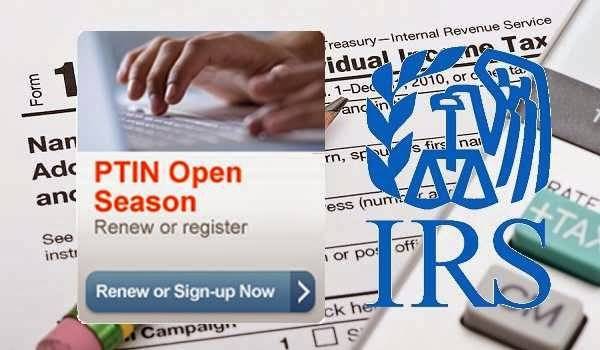The Internal Revenue Service is reminding the more than 690,000 federal tax return preparers in the U.S. that they must renew their Preparer Tax Identification Numbers (PTINs) for 2015. All current PTINs will expire Dec. 31, 2014.
Anyone who prepares or helps prepare any federal tax return or claim for refund , for compensation must have a valid PTIN from the IRS. The PTIN must be used as the identifying number on returns prepared.
“We ask that you renew your PTIN as soon as possible to avoid a last-minute rush, ,” said Carol A. Campbell, director, IRS Return Preparer Office. “It’s easy to let this slip as the holiday season approaches.”
For those who already have a 2014 PTIN, the renewal process can be completed online and only takes a few moments. The renewal fee is $63. If you cannot remember your user ID and password, there are online tools to assist you. Preparers can get started at www.irs.gov/ptin.
If you are registering for the first time, the PTIN application fee is $64.25 and the process may also be completed online.
Form W-12, IRS Paid Preparer Tax Identification Number Application and Renewal, is available for paper applications and renewals, but takes four to six weeks to process. Failure to have and use a valid PTIN may result in penalties. All enrolled agents, regardless of whether they prepare returns, must have a PTIN in order to maintain their status.
Issuance of ‘Annual Filing Season Program – Records of Completion’ to begin
PTIN holders who renew their PTIN for 2015 and have met the continuing education requirements for the new voluntary IRS Annual Filing Season Program will be contacted by the IRS with instructions on how to elect to participate and print their Annual Filing Season Program – Record of Completion.
The Annual Filing Season Program allows uncredentialed tax return preparers to obtain a record of completion when they voluntarily complete a required amount of continuing education, including a course in basic tax filing issues and updates, ethics, as well as other federal tax law courses.
Tax return preparers who elect to participate in the program will be included in a database on IRS.gov that will be available by January 2015 to help taxpayers determine return preparer qualifications.
The database will contain information on preparers with the Annual Filing Season Program qualification and it will also contain information about practitioners with recognized credentials and unlimited practice rights. These include attorneys, certified public accountants (CPAs), enrolled agents, enrolled retirement plan agents (ERPAs) and enrolled actuaries who are registered with the IRS.
“The Annual Filing Season Program is about improving and sustaining preparer education and ensuring that those who prepare Form 1040 tax returns have a basic understanding of filing season requirements,” Campbell said. “It is not about replacing the important tax work done by certified public accountants, enrolled agents and attorneys. Tax professionals with recognized credentials will be publicly listed on IRS.gov, and we plan to help inform taxpayers about all the options available.”
Thanks for reading CPA Practice Advisor!
Subscribe Already registered? Log In
Need more information? Read the FAQs




